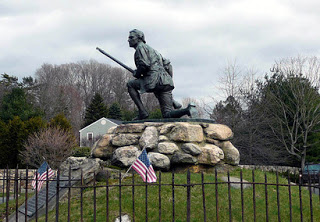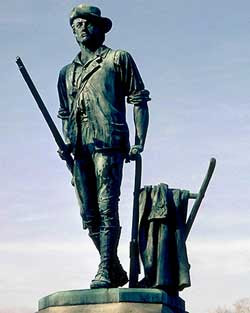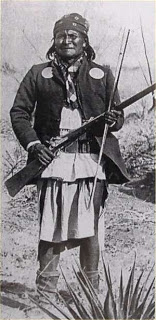No Duty To Retreat (Updated and corrected)
 The Colonial Minuteman: Proud symbol of the right to lethal self-defense against abusive government agents.
The Colonial Minuteman: Proud symbol of the right to lethal self-defense against abusive government agents.
A year ago, the State of Michigan enacted a law stipulating that individuals can properly use deadly force to defend themselves or others when confronted by an assailant threatening imminent death, bodily harm, or sexual assault. The measure specifies that this right is to be recognized and protected anywhere its exercise proves to be necessary — not merely in the sanctuary of an individual’s home, but “anywhere [the citizen] has the legal right to be with no duty to retreat….”
Those seeking a suitable brief summation of what it means to be a free man or woman can find a pretty decent one in the phrase, “no duty to retreat.”
To the best of my knowledge, Michigan and Louisiana are the only states of this once-free land whose laws governing self-defense explicitly disavow the spurious notion that free people under criminal attack have a duty to retreat before availing themselves of the innate right to lethal self-defense. And it is quite likely that even those state laws protect not a right, but a limited, situational privilege. [Actually, as a reader pointed out in the comments thread, 15 states have enacted “no duty to retreat” laws since 2005. I appreciate the correction, and regret my error. — WNG]
Would the self-defense laws in Michigan and Louisiana [and elsewhere] provide legal protection to a citizen who shoots a law enforcement officer threatening the illegal use of lethal force?
If not, they’re of very limited use. Without putting too fine a point on the observation, allow me to note that cases of lethal police abuse are becoming increasingly common, and defense against abusive agents of the State was the chief purpose of the Second Amendment — not protecting the means of hunting, as that venerable nimrod Bill Clinton once said; not just deterring armed crime by non-government actors, as the Quislings at the National Rifle Amendment insist; and certainly not preserving the ability of states to maintain “select militias,” as sundry dishonest collectivists maintain.
The Second Amendment made plain the Framers’ understanding that citizens must protect their ability to kill government agents when such action is required to defend the innocent. They understood that free people have no duty to retreat when confronted with illicit armed violence from the State. And they inscribed that understanding in the Second Amendment.
I write those words as someone unalterably opposed to aggressive violence in any form. My soul rebels at the thought of taking another human life. I pray that God will preserve me from situations in which bloodshed is a possibility. And I likewise pray that if the defense of my family required it, God would grant me the clarity of purpose to kill those who threaten them quickly and efficiently.
The right to armed resistance against unlawful police power was widely recognized until at least the dawn of the 20th Century. In the 1900 case John Bad Elk v. United States, the Supreme Court recognized that the killing of a law enforcement officer who acts without a proper warrant can be justifiable homicide: If said officer is “killed in the course of [a] disorder which naturally accompanies an attempted arrest that is resisted, the law looks with very different eyes upon the transaction, when the officer had the right to make the arrest, from what it does if the officer had no such right. What might be murder in the first offense might be nothing more than manslaughter in the other, or the facts might show that no offense had been committed.”
Florida Circuit Judge Rick de Furia recently ruled, in the case of John and Cynthia Coffin, that citizens have the right to resist unlawful violence committed by police officers — in this case, the unwarranted invasion of the Coffins’ home and the criminal assault on Cynthia. John, a heart patient in his mid-50s, did the right thing: He beat the invaders bloody, until forced to relent at gunpoint.
Under Black Elk — and the “no duty to retreat” principle in Michigan and Louisiana state laws — John would have been justified in shooting dead the armed invaders who had attacked his wife.
If this principle were widely recognized, Mississippi resident Cory Maye, a young father who shot an armed intruder who proved to be part of a police SWAT team conducting a no-knock raid on the wrong address — would not have been convicted of capital murder.
But ours is a form of despotism under which the immunities enjoyed by the State’s enforcers are so complete, and their very persons so sacred, that a police officer can arrest and charge with “assault on a government official” a sick man who coughs in his presence.
Police have a version of the “no duty to retreat” doctrine: They are empowered to use lethal force in circumstances in which neither they nor others are in mortal danger.
A very good example of that doctrine is displayed in this notorious car chase video:
Notice how the chase begins with the officer lying: The driver (who apparently stole the car) didn’t try to “ram” the police vehicle, but appeared to avoid a collision.
Note as well the statement at 2:05 into the video: “Eighty-three, I’m going to take this guy out if I get a chance.” In light of the lethal fusillade at the end of the chase, that statement strikes me as evidence of pre-meditated intent to kill the suspect.
The chase ended when the officer driving the first car rammed his vehicle into the allegedly stolen vehicle — and then began firing into the suspect’s car without warning. Another angle shows one of the three officers involved in the chase splayed T.J. Hooker-style on the hood of the car, firing multiple rounds into the suspect, 37-year-old Charles Wayne Bennett — and then asking the passenger if the driver had a gun (see the clip below).
The passenger, a neighbor and casual acquaintance of Bennett, was an innocent bystander. He had no idea why Bennett fled from the police, and believes that it wasn’t necessary to kill him:
According to police Captain James Schaffer, the shooting was justified because the car driven by Bennett “was being used as a weapon.”
This may have been true. However, there were other options available to the officers apart from summarily executing Bennett, such as disabling the vehicle by shooting out its tires after Bennett was pinned in.
Perhaps the use of non-lethal force would be considered a “retreat” of sorts — and the police don’t have the duty to retreat. That being the case, law-abiding citizens should be protected in exercising lethal force in exactly the same fashion when confronted with the threat of illicit violence from police.
I’m old enough to remember a time when police would fire warning shots. Russian comedian Yakov Smirnoff (whose career was a casualty of the Cold War’s end) once said that warning shots were America’s most appealing trait: “In Russia, the police just shoot the guy and that’s a warning to everybody else.”
On the evidence of the video above, Yakov — much to his dismay — should feel right at home in Amerika, 2007.
Please visit The Right Source and the Liberty Minute archive.
Dum spiro, pugno!
Content retrieved from: http://freedominourtime.blogspot.com/2007/10/no-duty-to-retreat.html.





























